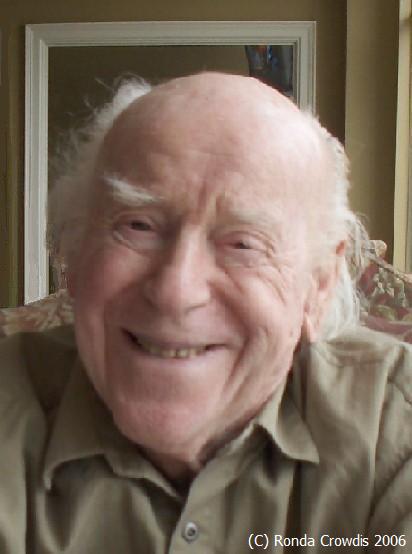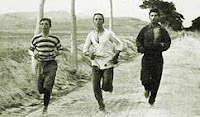
In Part 1 of this series about Getting Healthy and Fit, I covered some Rules for Eating Healthy. Today, I will cover some Rules for Exercising, and tomorrow I plan to write about Sticking to an Exercise Plan.
First let me say: eating healthy is a great foundation for getting fit and healthy, but exercise is what will really get you there. Actually, you can do one and not the other, but you'll only be halfway there, really. You need both.
Rules for Exercising
I have been exercising fairly steadily for more than a year now -- starting in December 2005, I began a pretty ambitious running program. In fact, about a month after I started running, I got a big head and decided I would attempt to train for and complete a marathon. After some struggles during the year, I completed the marathon in December 2006. This year, I am training for a triathlon, learning to bike and swim in addition to continuing my running.
So I've learned a lot about exercising in the last year. Not only am I learning by doing, but I've learned a lot from others, books that I've bought, and websites that I've been continually researching.
What follows are some of the tips I have for those who want to begin and maintain a healthy exercise program.
Exercise Rule #1: Start today, and just do anything to get you going. It doesn't matter what exercise you choose, just start. I think walking and running are great ways to start, because you don't have to pay to join a gym or get fancy equipment. All you need is a pair of shoes. I started with an old beat-up pair of sneakers, and didn't buy real running shoes until I'd been doing it a few weeks. Swimming and biking are two great exercises too, though.
Exercise Rule #2: Stop making excuses. I know from experience -- we all have a million excuses. Not enough time. No place to work out. I'm tired. I don't have the money. These are all a load of crap. I don't blame anyone for making these excuses, because I made them myself, but the truth is, we rationalize so that we can continue to be lazy. It isn't as hard as you think. Just set a date with yourself, or your spouse, or a friend, to get out for just 10 or 15 minutes today, and walk or jog. No! Stop making excuses!
Exercise Rule #3: Just put on your running shoes, and get out the door. That's all you have to do. The rest will be much easier than you think. It's the initial inertia that we must overcome. Once you've done that, it's actually invigorating and fun.
Exercise Rule #4: Start out small, and slowly. You might start a program full of vim and vigor, ready to run a marathon or lift huge weights. Hold yourself back. The main reason is that if you start slowly, you are more likely to succeed, and if you start by trying to do too much, you will more likely burn out and fail. If you think you can run for 30 minutes, only run 10 or 15 to start with, then slowly increase over a matter of weeks. Try for 2-3 times a week at first, with the goal of exercising for at least 30 minutes five times a week, eventually. The side benefit -- and this is a great one -- is that if you hold yourself back, you'll be eager to get to your next workout, when you'll be doing a little more than this one. And that eagerness is a tremendous boost.
Exercise Rule #5: Make your goal public. Post it on your blog. Tell your family and friends. Sign up for a site like Traineo.com, where your workouts and weight loss are emailed to several "motivators" that you choose. For my marathon and triathlon goals, I began writing a column every two weeks for my local newspaper, as a journal of my personal journey along the way. Positive public pressure will keep you motivated for a sustained period -- you won't want to let people down and look bad. Don't let the pressure up -- once you do, your motivation will go away.
Exercise Rule #6: Reward yourself. Make a list of mini goals, and next to each one, list an appropriate reward. For example, if you just go out and jog today, allow yourself to buy a book on Amazon. If you can do it for two days, give yourself an ice cream. If you can do it for a week, buy some songs for you iTunes. Whatever rewards work for you -- be they shoes, clothes, a massage, a tattoo, or whatever, let yourself have them after reaching the mini goals. Just don't make it too much sweets!
Exercise Rule #7: Allow yourself adequate rest. Some people try to run hard every day, or workout hard every day. Just remember, your muscles need rest in order to recover. If you don't let them recover, you are just continually breaking them down. Follow the hard-easy rule: after a day of hard exercise, go easy or rest the next day. Also, you need at least a day of rest each week. Your body can only take so much before it begins to break down. Don't let it get to that point. Many very wise people have said that rest is just as important as exercise when it comes to improving performance.
Exercise Rule #8: Think positive. This is probably the best rule of the bunch. It has helped me in countless ways. Any time that a negative thought comes into your head ("I can't do this!" "It's too hard!" "I don't feel like working out now!" "I want to stop!" "I feel lazy today!"), just push it out. Squash it. And then replace it with positive thoughts: I can do this! I am strong! This isn't too hard! If Leo can do it, so can I! This is no problem! I'm tough! I am AWESOME!!!!!! Positive thinking will get you past any exercise barrier.
Exercise Rule #9: Don't be motivated only by weight loss goals. If you're just trying to lose weight, you will more than likely stop. Why? I have no idea, but it's true. Have other motivators: do it to feel good, for the great energy you get, to lower your medical bills, to live longer, to enjoy life more, to look better, to be stronger, to be healthier, to achieve something worthwhile, to overcome a challenge. Make a list of the reasons you want to exercise and post them up somewhere. And yes, cut out a picture from a magazine that will motivate you and post that up too. Losing weight is a great goal, but don't let it be your only one.
Exercise Rule #10: If you fail, get up, brush yourself off, and start again. We all fail sometimes. No matter how great we are, we fail. I have missed workouts plenty of times in the last year, but the key is that I just get back on that horse again. I don't let it stop me from continuing. Look at it like I do: it's a long road ahead of us, and little problems along the way are mere bumps in the road. Don't let a bump in the road stop you from continuing your journey.
Exercise Rule #11: If you can, get a workout partner. It's a great motivator. If you know you have to meet someone to workout, you're more likely to keep that appointment. However, if your partner has to cancel for some reason, don't let that stop you from working out on your own.
Exercise Rule #11: Have fun! Exercise can and should be fun. Don't let it be painful. If it is, slow down a bit, and enjoy the scenery. Exercise in a nice place, with water or trees. Breathe deeply and enjoy the fresh air! Look at that sunrise or sunset! The day is glorious, and you are partaking of it fully. Life is great!






